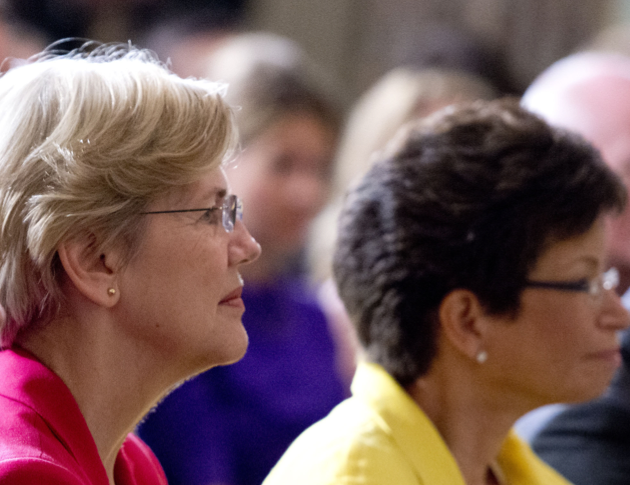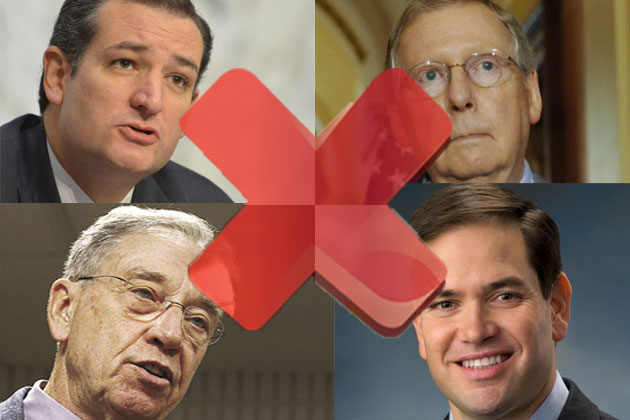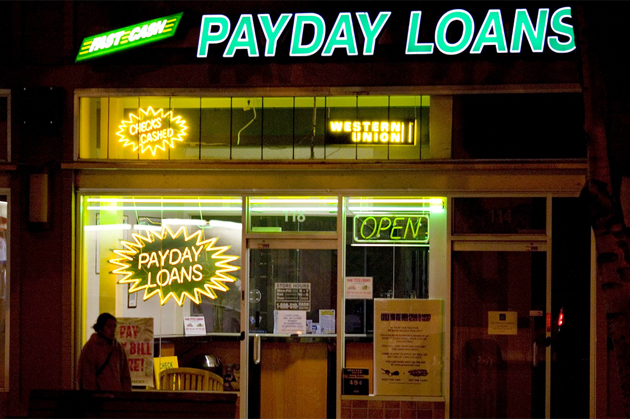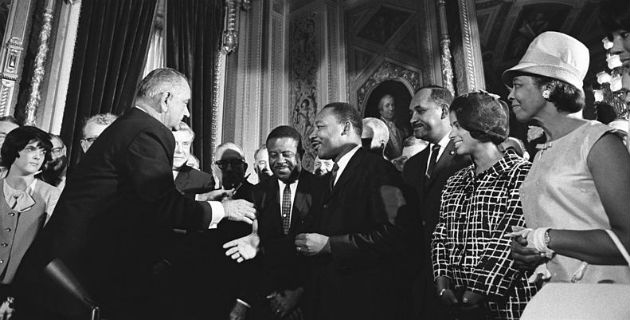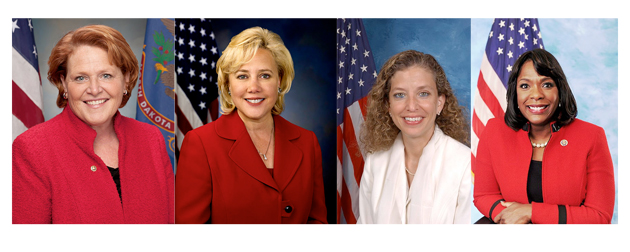
Heidi Heitkamp: <a href="http://commons.wikimedia.org/wiki/File:Heidi_Heitkamp_official_portrait_113th_Congress.jpg">US Senate</a>/Wikimedia; Mary Landrieu: <a href="http://commons.wikimedia.org/wiki/File:Mary_Landrieu_Senate_portrait.jpg">US Senate</a>/Wikimedia; Debbie Wasserman-Schultz: <a href="http://commons.wikimedia.org/wiki/File:Debbie_Wasserman_Schultz,_official_photo_portrait,_color.jpg">US Congress</a>/Wikimedia; Terri Sewell: <a href="http://commons.wikimedia.org/wiki/File:Terri_Sewell,_Official_Portrait,_112th_Congress.jpg">US Congress</a>/Wikimedia
Dozens of Democrats are pushing back against an Obama administration effort to curb racial discrimination by car dealerships.
In late March, the Consumer Financial Protection Bureau—the consumer watchdog agency dreamt up by Sen. Elizabeth Warren (D-Mass.)—issued new, voluntary guidelines aimed at ensuring car dealerships are not illegally ripping off minorities. Since then, 13 Senate Democrats, including Sens. Heidi Heitkamp (D-N.D.) and Mary Landrieu (D-La.); and 22 House Dems, including Reps. Debbie Wasserman-Schultz (D-Florida) and Terri Sewell (D-Ala.), have joined 19 House and Senate Republicans in signing letters to the agency objecting to the anti-discrimination measure. Consumer advocates and congressional aides say the lawmakers’ backlash against the anti-discrimination rules is unjustified, and that Dems have backtracked on civil rights in this instance because of the colossal power of the car dealership lobby, which has spent millions lobbying Congress in the months since the CFPB issued these new guidelines.
Auto dealers “wield enormous amounts of power,” one Democratic aide explains. “There’s one in every district. They give a lot of money to charity. They’re on a bunch of boards. They sponsor Little Leagues.”
When a dealership makes a car loan, it often sells the loan to a bank or credit union, which, in return, allows the dealership to mark up the interest rate. Here’s the problem: Some dealerships have been accused of charging higher rates to black and Hispanic customers, potentially costing consumers millions of dollars in overcharges. The CFPB’s anti-discrimination guidance reminds lenders that they are liable under federal law if car dealerships they work with charge higher interest rates to minority borrowers. The guidance suggests that lenders help prevent discrimination by educating dealers, increasing oversight, and either capping dealership interest rates or requiring dealers to charge a flat fee.
Auto dealers are up in arms. If lenders follow the CFPB’s advice, dealership profits could fall by hundreds of dollars per car sold, according to the Department of Justice. Car dealer trade groups claim that the CFPB has not adequately proved that discrimination is a problem in the industry. Dealerships have spent millions lobbying Congress over the past year, including on this very issue. Many Democrats have the auto dealers’ back. In their letters to the CFPB, Dems claim that they appreciate the CFPB’s goal of curbing discrimination by car dealerships. But they echo the dealers’ arguments, and demand that the CFPB provide the detailed methodology it uses to determine that some dealers may be discriminating.
The CFPB maintains that the way it detects discrimination in the auto industry should be no mystery to Congress. These methods, which are similar to those used by the DOJ and other federal banking regulators, have been used in voting rights cases, discrimination cases, and jury selection cases for decades, a CFPB spokeswoman notes. Here’s how it works: Because customer race and ethnicity data is not available for auto loans, the CFPB uses proxies, including geography and surname, to see if lenders are allowing dealerships to charge higher interest rates to minorities. The CFPB has responded to lawmakers’ requests for this methodology in letters, at a public forum on the issue, and on its website.
If lawmakers don’t trust the feds’ definition of discrimination, they can also look to the courts. In December, the DOJ and the CFPB reached a $98 million settlement with Ally Financial and Ally Bank over claims that Ally’s markup policies resulted in illegal discrimination against over 235,000 minority borrowers. At least seven class-action lawsuits have been filed over the past 14 years that allege auto-dealers unfairly overcharged minorities. And “nothing has really changed in the marketplace” to force auto lenders and dealerships to change their practices, says Chris Kukla, the senior counsel for government affairs at the Center for Responsible Lending, a nonprofit consumer rights group.
Car dealers have also complained that regulating the interest rates dealerships can charge will increase costs for consumers. Consumer advocates disagree: “I don’t believe…[dealers’] ability to mark up prices…in any way benefits consumers,” says Stuart Rossman, director of litigation the National Consumer Law Center, an advocacy group. Jeff Sovern, a law professor and expert in consumer law at St. John’s University in New York, adds that the low prices some customers have been paying may have been subsidized by the higher prices paid by minorities. “It’s not usually considered a defense that the beneficiaries of racism should keep the lower prices that other groups pay for,” he says.
So why the outcry amongst Democrats? Congressional aides and consumer advocates say that the auto dealer industry’s lobbying efforts are intense. “Dealers are a powerful lobby,” Kukla says. “These people sell things for a living. They’re good at advocating.”
“I’m not surprised that any politician” would cave to the dealerships, Rossman adds. The National Automobile Dealers Association (NADA), an industry trade group, has spent $3.1 million on lobbying in 2013, according to lobbying disclosure forms. “The dealerships made a very concerted push to get [members of Congress] to sign those letters” criticizing the guidance, Kukla says.
None of the 35 Democrats responded to requests for comment for this story, nor did the National Association of Minority Automobile Dealers, another industry trade group. NADA declined to comment.
The oddest aspect of Democrats’ push back on the CFPB anti-discrimination measures, advocates say, is that in issuing the guidance, the CFPB didn’t actually create any new regulation or law. “The funny thing is that… [the CFPB] is getting hit…because someone is actually enforcing rules already on the books,” says the Dem aide.
“It’s not that controversial,” Rossman adds.
